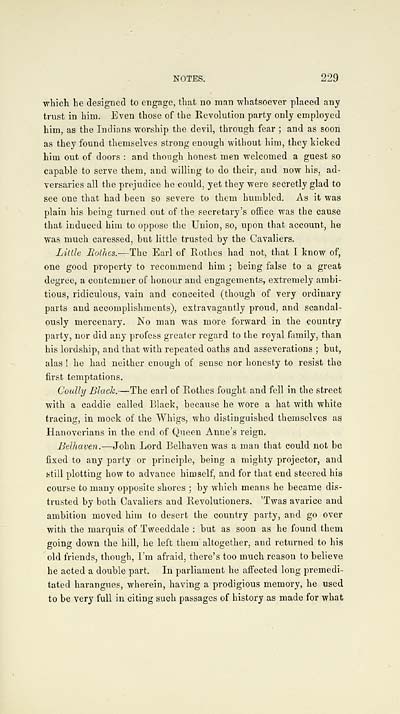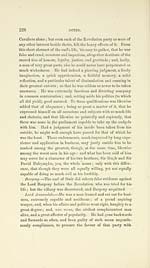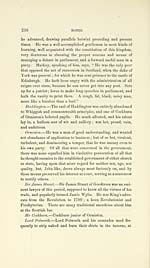Glen Collection of printed music > Printed music > Jacobite relics of Scotland > [First series]
(253) Page 229
Download files
Complete book:
Individual page:
Thumbnail gallery: Grid view | List view

NOTES. 229
which he designed to engage, that no man whatsoever placed any
trust in him. Even those of the Revolution party only employed
him, as the Indians worship the devil, through fear ; and as soon
as they found themselves strong enough without him, they kicked
him out of doors : and though honest men welcomed a guest so
capable to serve them, and willing to do their, and now his, ad-
versaries all the prejudice he could, yet they were secretly glad to
see one that had been so severe to them humbled. As it was
plain his being turned out of the secretary's office was the cause
that induced him to oppose the Union, so, upon that account, he
was much caressed, but little trusted by the Cavaliers.
Little Eothes. — The Earl of Rothes had not, that I know of,
one good property to recommend him ; being false to a great
degree, a contemner of honour and engagements, extremely ambi-
tious, ridiculous, vain and conceited (though of very ordinary
parts and accomplishments), extravagantly proud, and scandal-
ously mercenary. No man was more forward in the country
party, nor did any profess greater regard to the royal family, than
his lordship, and that with repeated oaths and asseverations ; but,
alas ! he had neither enough of sense nor honesty to resist the
first temptations.
Coully Blade. — The earl of Rothes fought and fell in the street
with a caddie called Black, because he wore a hat with white
tracing, in mook of the Whigs, who distinguished themselves as
Hanoverians in the end of Queen Anne's reign.
Belhaven. — John Lord Belhaven was a man that could not be
fixed to any party or principle, being a mighty projector, and
still plotting how to advance himself, and for that end steered his
course to many opposite shores ; by which means he became dis-
trusted by both Cavaliers and Revolutioners. 'Twas avarice and
ambition moved him to desert the country party, and go over
with the marquis of Tweeddale : but as soon as he found them
going down the hill, he left them altogether, and returned to his
old friends, though, I'm afraid, there's too much reason to believe
he acted a double part. In parliament he affected long premedi-
tated harangues, wherein, having a prodigious memory, he used
to be very full in citing such passages of history as made for what
which he designed to engage, that no man whatsoever placed any
trust in him. Even those of the Revolution party only employed
him, as the Indians worship the devil, through fear ; and as soon
as they found themselves strong enough without him, they kicked
him out of doors : and though honest men welcomed a guest so
capable to serve them, and willing to do their, and now his, ad-
versaries all the prejudice he could, yet they were secretly glad to
see one that had been so severe to them humbled. As it was
plain his being turned out of the secretary's office was the cause
that induced him to oppose the Union, so, upon that account, he
was much caressed, but little trusted by the Cavaliers.
Little Eothes. — The Earl of Rothes had not, that I know of,
one good property to recommend him ; being false to a great
degree, a contemner of honour and engagements, extremely ambi-
tious, ridiculous, vain and conceited (though of very ordinary
parts and accomplishments), extravagantly proud, and scandal-
ously mercenary. No man was more forward in the country
party, nor did any profess greater regard to the royal family, than
his lordship, and that with repeated oaths and asseverations ; but,
alas ! he had neither enough of sense nor honesty to resist the
first temptations.
Coully Blade. — The earl of Rothes fought and fell in the street
with a caddie called Black, because he wore a hat with white
tracing, in mook of the Whigs, who distinguished themselves as
Hanoverians in the end of Queen Anne's reign.
Belhaven. — John Lord Belhaven was a man that could not be
fixed to any party or principle, being a mighty projector, and
still plotting how to advance himself, and for that end steered his
course to many opposite shores ; by which means he became dis-
trusted by both Cavaliers and Revolutioners. 'Twas avarice and
ambition moved him to desert the country party, and go over
with the marquis of Tweeddale : but as soon as he found them
going down the hill, he left them altogether, and returned to his
old friends, though, I'm afraid, there's too much reason to believe
he acted a double part. In parliament he affected long premedi-
tated harangues, wherein, having a prodigious memory, he used
to be very full in citing such passages of history as made for what
Set display mode to: Large image | Transcription
Images and transcriptions on this page, including medium image downloads, may be used under the Creative Commons Attribution 4.0 International Licence unless otherwise stated. ![]()
| Special collections of printed music > Glen Collection of printed music > Printed music > Jacobite relics of Scotland > [First series] > (253) Page 229 |
|---|
| Permanent URL | https://digital.nls.uk/91269835 |
|---|
| Shelfmark | Glen.194 |
|---|---|
| Additional NLS resources: | |
| Attribution and copyright: |
|
| Description | Being the songs, airs, and legends, of the adherents to the house of Stuart. Collected and illustrated by James Hogg. Edinburgh: Printed for William Blackwood, 1819-1821. [First series] -- second series. |
|---|---|
| Shelfmark | Glen.194-194a |
| Description | Scottish songs and music of the 18th and early 19th centuries, including music for the Highland bagpipe. These are selected items from the collection of John Glen (1833 to 1904). Also includes a few manuscripts, some treatises, and other books on the subject. |
|---|
| Description | The Glen Collection and the Inglis Collection represent mainly 18th and 19th century Scottish music, including Scottish songs. The collections of Berlioz and Verdi collected by bibliographer Cecil Hopkinson contain contemporary and later editions of the works of the two composers Berlioz and Verdi. |
|---|

